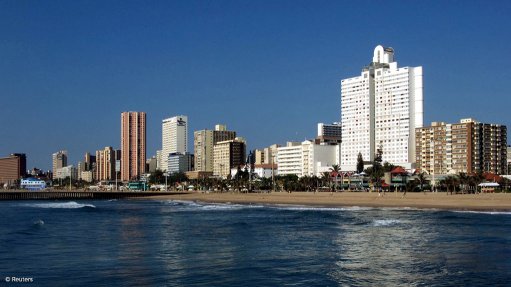
The Durban skyline in the eThekwini municipality
The eThekwini municipality, which has been badly affected by recent deadly rioting and looting, is pushing ahead with its electricity procurement plans and has issued a request for information (RFI) as part of preparations for the procurement of 400 MW of new generation capacity from independent power producers (IPPs).
The RFI is in line with the city-region’s recently adopted Energy Transition Policy, encompassing the eThekwini Integrated Resource Plan, which outlines a phased transition to it sourcing 40% of its electricity from renewable-energy sources by 2030, and increasing that to 100% by 2050.
It also follows on from the publication, in 2020, of gazetted amendments to the Electricity Regulations on New Generation Capacity of the Electricity Regulation Act, authorising municipalities in good financial standing to procure new generation capacity in accordance with the national Integrated Resource Plan.
Various municipalities across South Africa have indicated that they intend to take advantage of the change to either build or procure new electricity, so as to improve security of supply and affordability, while reducing their carbon emissions.
Through its Municipal Independent Power Producer Programme (MIPPP), eThekwini is aiming to procure 400 MW of capacity from IPPs to provide “safe, flexible, dispatchable and reliable supply from an appropriate energy portfolio mix of generation sources”.
The MIPPP, which will be implemented in phases, includes a short-term target of this new generation capacity reaching commercial operation by July 2025 or earlier.
Its medium-term target calls for new generation capacity to reach commercial operation in July 2030, while the long-term target aims for commercial operation in July 2050.
Mayor Mxolisi Kaunda says a key objective of the procurement is to mitigate the impact of load-shedding, as well as to create jobs.
He adds that the changing energy landscape in South Africa also requires “aggressive energy reforms” aligned with eThekwini’s Climate Action Plan.
The RFI is open until 16:00 on September 10, with the deadline for submission of clarification questions set as being 16:00 on August 27.
Through the RFI, the city aims to gather information from experienced energy service providers that will support its procurement preparations and identify opportunities in the market for alternative power generation capacity within the region.
It will also seek to understand each development opportunity’s indicative business model, the structure of the organisation and the contribution to eThekwini’s sustainable development.
Respondents to the RFI are expected to outline whether their projects would provide baseload, peaking, or mid-merit capacity, as well as whether the plant would be dispatchable or hybrid dispatchable.
The RFI was released as eThekwini met CEOs to assure them of the city’s commitment to safeguard investments following recent deadly rioting and looting in the area.
Kaunda said in a statement that interventions would be taken to "replace the despair prevailing in our society with tangible plans that will transform the lives of our people for generations to come".
"The task of rebuilding the city’s infrastructure is going to require collaboration between the city, province and national government – working closely with all the stakeholders in business. It is in everyone’s interest that we succeed in our efforts to bring renewed hope to the citizens and help the city rise from the ashes."
eThekwini's Sbu Ntshalintshali told Engineering News that the IPP procurement was at the centre of the city's economic recovery plan.
"It will further provide energy security to the businesses affected by recent social unrest," he added, noting that, besides energy infrastructure projects, the city would be creating an energy industry that would support local manufacturing capabilities in Durban.